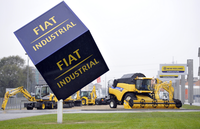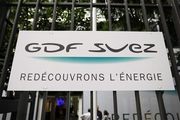 |
|
Welcome to issue no. 2 / 2014 of EWC News. 30 July 2014
|
|
The
Academy for European Works Councils (EWC Academy)
EWC
News appears four times a year.
You can find past issues in the newsletter archives.
|
|
1.
No
layoffs without serious consultation
|
|
Collective redundancies in Spain once again canceled in court
At Coca-Cola, just as in the US automobile supplier Tenneco ruling from February 2014 in northern Spain (see report in EWC News 1/2014), the issue concerned the correct implementation of the consultation procedure. On 10 December 2013, CCIP announced the closure of four of its eleven filling plants in Spain (Palma de Mallorca, Alicante, Asturias and near Madrid), which would have meant the dismissal of 30% of the Spanish workforce. At the same time, the US-beverage group`s subsidiary recorded a 900 million € yearly profit on the Iberian Peninsula. The first 235 redundancies were announced on 1 April 2014.
During the statutory 30-day consultation period the management showed no willingness to seriously seek alternatives to the closures. This represented a breach of the law in the opinion of the Court. Consultation is useless in such a context and therefore invalid; without valid consultation no redundancies can take place. At the end of the consultation period on 21 January 2014, the sites threatened by closure went on strike, which management proceeded to undermine by relocating production to other sites. In the opinion of the judges this was a serious violation of the right to strike which is guaranteed by the Spanish constitution and aimed at balancing the power of negotiating parties.
CCIP is now refusing to execute the court ruling and wants to challenge it before the Supreme Court. But a similar trend could be seen in another case in March 2013 (see report in EWC News 2/2013). On 4 July 2014 the CC.OO. union filed a preliminary injunction for the immediate reinstatement of all dismissed employees.
Thorough consultation process saves site
Although it is only a small site on the outskirts of Europe, the events in the Tenneco case have European wide significance. The closure could be avoided, because employee representatives were confronted with inadequate consultation procedures which could be consistently challenged in court (see report in EWC News 1/2014). It was only after all redundancies had been canceled in court, that the US-management seriously considered alternatives to the closure. The CEO from the United States discussed this for the first time on 15 April 2014 in Rome with a representative of the European Commission. In a meeting with central management and works councils held on 30 April 2014 in Brussels it became clear that the site would not be closed. Finally, after the successful conclusion of negotiations, the US group's vice president even paid a visit to the site in Spain on 3 July 2014.
Up to now, an in-depth understanding of the consultation model originating from French labour legislation and which strongly influenced the relevant EU Directives has generally been lacking in Germany (see report in EWC News 3/2011). This is clearly demonstrated by the US automobile supplier Visteon case, whose EWC tried in vain to prevent mass redundancies in Spain in September 2011, through legal proceedings before the Cologne state labour court (see report in EWC News 3/2011). The question arises as to when this issue will be resolved by the European Court of Justice.
Forthcoming event: How to consult properly?
|
|
2.
German judges restrict EWC work
|
|
Steering Committee members may not travel to England
On 8 April 2014 the labour courts in Lörrach ruled on the rights of a European works council to make site visits. It prohibited the steering committee of the Australian packaging group, Amcor, from sending two of its members to the Cumbria plant (northern England) on 24 April 2014 to directly inform reps on site.
In the opinion of the Court and central management, only British representatives are responsible for passing on EWC information to employee representatives in the United Kingdom. The EWC cannot decide for itself whether its chairman or any other member of the Steering Committee should be entrusted with this task. Although the British representatives had attended the last EWC-plenary session in October 2013, they are not directly involved in the work of the steering committee.
The case raises a fundamental legal issue for all European works councils. Article 10 of the new EWC Directive defines the role of representatives. Accordingly they "shall have the means required ... to represent collectively the interests of the employees". They not only have the right but the duty to inform local representatives about their activities. However the legislator leaves the question open of how this is to be carried out in concrete terms. The State court of Baden-Württemberg in Freiburg will shortly have to deal with the matter since the EWC has filed an appeal against the ruling.
External trade union representatives may not participate in meetings
On 4 June 2014 the labour court in Lörrach passed a further ruling. The EWC of Amcor is hereby not entitled to invite trade union officers to its meetings. This applies even if there is no cost involved. In the opinion of the Court, EWC meetings are not open to the public and trade union officers have no legal right to participate. However, they may request the EWC to participate as an expert should they have special expertise. Unlike the provisions of the EU Directive, in Amcor, participation of experts to meetings is subject to the "approval of both parties", EWC and central management. In other words, employee representatives' experts must first pass through a kind of employer "Assessment Center" before they can start work. The EWC also wants to appeal against this ruling.
The Australian packaging group, Amcor
The European works council was founded in 1998 under German jurisdiction and the EWC agreement last updated in 2002. It is therefore automatically subject to the new EU Directive. Amcor has its European headquarters in Zurich and tries very hard to dispute any room that the EWC has to maneuver. In June 2013 the same court prohibited employee representatives from publishing a critical report about the last EWC meeting on the Intranet (see report in EWC News 3/2013). There are currently therefore, a total of three court proceedings at Amcor with considerable significance for the entire European works council landscape, assuming they come before the European Court of Justice in Luxembourg.
Forthcoming Event
|
|
3. New court rulings before EWC establishment
|
|
First ever EWC court ruling in Italy
In Italy, SNB members are not elected by the employee representative body, RSU (comparable to a works council), but are appointed by the unions, and only from those who have signed the industry or company collective bargaining agreement. As a consequence of Fiat abandoning the employers' association and the collective industry agreement, since 1 January 2011, the only agreements which are valid are at a company level and were signed by four trade unions, but not by the militant FIOM. Since then, the FIOM has been excluded from any workplace involvement at Fiat, and consequently also from the SNB. In July 2013 the Italian Constitutional Court in Rome declared this practice to be unconstitutional and the FIOM was given back its RSU mandates (see report in EWC News 3/2013). The recent ruling therefore represents a consistent application of the Constitutional Court's decision.
New basis for workplace
representation and collective bargaining
  French judges surrender
jurisdiction to London French judges surrender
jurisdiction to LondonOn 17 July 2014, the Paris district court passed a first instance ruling on its competency for the establishment of Manpower’s European works council. Although the request for the EWC’s establishment had been made by employee representatives from several countries on 28 May 2013, the US recruitement company has, up to this day, not yet convened the Special Negotiating Body’s (SNB) constitutional meeting. According to trade unions, after expiration of the legally defined 6-month period, a default EWC should be immediately established under French jurisdiction. The judges however have ruled that London is to have jurisdiction for the EWC and rejected the proceedings filed against the company in France. In the opinion of the trade unions, France with the largest workforce should be responsible for the establishment of the EWC. Manpower has 95,000 employees in France and only 48,000 in the United Kingdom. All other countries in Europe are significantly smaller. British jurisdiction is applicable, according to the judges, as a consequence of an internal email dated 28 September 2011. This was a request by US central management asking the London office (photo) to conform to all of the obligations resulting from the EWC Directive. Employee representatives were however not informed about this communication. The ruling may be challenged in an appeal court. This raises two fundamental issues of European wide significance: 1. Can central management decide on its own which country has jurisdiction? 2. What happens when the legally defined period for SNB constitution has expired? The first issue was the subject of a legal battle in Germany at the U.S. automobile supplier, Visteon (see report in EWC News 1/2012). The case was settled however without a court decision and the EWC continues to operate under German jurisdiction. In the Manpower case, and in parallel with the legal proceedings in Paris, the British trade union, Unite, requested the intervention of the Central Arbitration Committee (CAC) in London but has since withdrawn the case. |
|
4. British EU referendum and
labour legislation
|
|
Announced EU referendum coming or not?
Since Mrs Thatcher’s arrival in office as prime minister in 1979, there has been no social progress made in the United Kingdom, stemming from within the country itself. Any progress in social policy over the last few years has often been a direct result of EU legislation, following the end of the opt-out from the EU Social policy under the Blair government, in 1997. European works councils were furthermore only introduced into British legislation on 15 December 1999.
According to an evaluation made by the European Trade Union Institute in Brussels, who for the first time in 2009, established the European Participation Index (EPI) based on a points system (see report in EWC News 2/2009), the United Kingdom was rated with the lowest level of employee participation of all countries in Western Europe. British workers are far more exposed to the arbitrariness of the employer than in other parts of the EU. This invites companies from countries with strong participation, to treat British workers more poorly. For example, after 25 years of service the dismissal of a car factory employee in France costs 200,000 euros as opposed to England, where it's only 7,500 euros. Following a withdrawal from the EU, this situation is likely to continue to worsen. EU membership is therefore a high ranking social policy issue for British workers. What are the scenarios after EU withdrawal?
In Switzerland, the accession to the European Economic Area was rejected by referendum in 1992. However, in order to benefit from the advantages of the common market, comprehensive bilateral agreements between Switzerland and the EU were concluded in 1999 and 2004. By these means, important parts of the EU legislation have been adopted in the Swiss national legislation. In order to prevent Switzerland from "cherry picking", these agreements are inter-connected to one another through a "guillotine clause"; if a tiny part of an agreement is terminated, all agreements are automatically terminated. In December 2008 Switzerland adhered to the Schengen Agreement and abolished border controls with the EU (see report in EWC News 3/2008). Since September 2011 the Swiss franc has been coupled to the euro exchange rate to avoid job losses in Switzerland. The European Works Council Directive however does not apply, since there was no majority on it in Parliament, in June 2012 (see report in EWC News 2/2012).
Do British EWC members lose their mandates after EU withdrawal?
Prior to 15 December 1999 there was no EWC legislation in the United Kingdom. Nevertheless, at that time many large British companies had established a EWC. The EWC agreement was then, for example under Belgian, German or French jurisdiction. Usually the United Kingdom workforce was also integrated into the European works council. In companies with headquarters in Switzerland the local workforce is represented on the EWC in over 70% of the cases. This suggests that in practice, a massive loss of British mandates will probably not happen. The situation is different in EWC agreements under British jurisdiction. It remains entirely uncertain, as to whether or not they will continue to apply or have to be completely renegotiated.
Forthcoming Event
Limitation
of the right to strike - no breach of human rights
  On
8 April 2014, the British laws on strike rights dating from the
Thatcher years was the subject of a ruling from the European Court of
Human Rights in Strasbourg, for the first time. The case had been filed
by the RMT Union (see report in EWC
News 4/2012).
In the court’s opinion the prohibition of solidarity strikes
("secondary action") in the transport sector is compatible with the
freedom of association. The national legislators have herein a certain
degree of flexibility. The European Trade Union Confederation (ETUC) in
Brussels also published a legal opinion on the hearing. The decision is
surprising, since the Court had ruled favorably in a similar case in
April 2009, against Turkey (see report in
EWC News 2/2009). The ruling can be challenged in the Grand
Chamber. On
8 April 2014, the British laws on strike rights dating from the
Thatcher years was the subject of a ruling from the European Court of
Human Rights in Strasbourg, for the first time. The case had been filed
by the RMT Union (see report in EWC
News 4/2012).
In the court’s opinion the prohibition of solidarity strikes
("secondary action") in the transport sector is compatible with the
freedom of association. The national legislators have herein a certain
degree of flexibility. The European Trade Union Confederation (ETUC) in
Brussels also published a legal opinion on the hearing. The decision is
surprising, since the Court had ruled favorably in a similar case in
April 2009, against Turkey (see report in
EWC News 2/2009). The ruling can be challenged in the Grand
Chamber. |
|
5. Newly
established European
Works Councils
|
  High EWC standard in US Company High EWC standard in US CompanyA EWC agreement for PerkinElmer, the US-laboratory outfitter, was signed on 28 May 2014 in Brussels under British jurisdiction. It fully integrates the standards of the new EWC Directive. Transnational competence begins already if only one country is significantly affected. Any restructuring involving at least 30 employees within 90 days in two countries, is considered as exceptional circumstances triggering a consultation procedure. The precisely defined structure of the procedure is remarkable for a British EWC agreement. Short deadlines have however been fixed: the EWC has to render its opinion within 10 working days. The most important European countries within PerkinElmer are Finland, Germany, Italy and the United Kingdom. Small countries with fewer than 25 employees are not represented in the EWC. Plenary sessions take place once a year in Brussels. The select committee is made up of five representatives from different countries. EWC members have the right to communicate with the entire workforce of those countries having no central or group works council. Although training takes place during EWC meetings, individual members may however participate in external events. Another EWC established in US-company   A
EWC agreement for Emerson Electric was signed on 18 June 2014 in
Brussels. The conglomerate has over 130,000 employees in 150 countries.
The agreement is under British jursidiction and the EWC composed of 27
members from 22 countries. The consultation procedure has been
carefully structured with tight deadlines. Two experts may be
designated independently of each other. The EWC is involved, if within
a 120-day period, at least 300 employees are affected by restructuring
in two countries. A
EWC agreement for Emerson Electric was signed on 18 June 2014 in
Brussels. The conglomerate has over 130,000 employees in 150 countries.
The agreement is under British jursidiction and the EWC composed of 27
members from 22 countries. The consultation procedure has been
carefully structured with tight deadlines. Two experts may be
designated independently of each other. The EWC is involved, if within
a 120-day period, at least 300 employees are affected by restructuring
in two countries.The existing European works councils in some subsidiaries are however now being dissolved, such as the EWC of the air-conditioning division established in 2004 or the Leroy Somer EWC in 2011 (see report in EWC News 2/2011). EWC established in Japanese automobile supplier  A
EWC agreement for U-Shin was signed on 18 June 2014 in
Bonneuil-sur-Marne near Paris, under French jurisdiction. The Japanese
group acquired the door and steering wheel locks manufacturing from the
French company Valeo in May 2013. The EWC agreement was negotiated in
just half a year. It is closely aligned to the agreement of the former
owner, Valeo, where a EWC has already existed since 1999. A
EWC agreement for U-Shin was signed on 18 June 2014 in
Bonneuil-sur-Marne near Paris, under French jurisdiction. The Japanese
group acquired the door and steering wheel locks manufacturing from the
French company Valeo in May 2013. The EWC agreement was negotiated in
just half a year. It is closely aligned to the agreement of the former
owner, Valeo, where a EWC has already existed since 1999.The European works council of U-Shin will include five countries. More than half of the workforce represented belongs to Slovakia. According to French custom, the council is chaired by the employer. The employee representatives elect a steering committee made up of five members. Each representative has a right to four days training during the four-year term of office. The EWC has to render its opinion within a "reasonable" period. An exact time limit is not foreseen in the EWC agreement in order to ensure an in-depth consultation procedure. We have compiled a selection of EWC agreements on a download page. |
|
6. New SE
agreements
|
|
Market leader in online fashion shopping operating as European Company (SE)
The SE agreement provides for three employee representatives on the Supervisory Board (one-third representation), but is otherwise not very employee friendly. The size of the SE works council is as such limited to nine members. Since Zalando does not yet have any local works councils, the German members are elected directly by the workforce. A similar solution was also adopted by Warema, the Bavarian metal-working company in 2009 (see report in EWC News 2/2010). The SE works council may hold meetings twice per year. Whereas the right to training and the size of the three member steering committee have been restricted to exactly fulfill the legal provisions, the competence of the SE works council has been defined below the legal mimimum standard. An extraordinary consultation procedure is foreseen for circumstances affecting 1% of the total European workforce. It is almost certainly the first SE agreement in Europe containing the following clause: "The SE works council shall not be entitled to file injunction proceedings against measures". It is thereby permanently retrograded into playing a "song and dance act" which is surely not compatible with EU legislation. Zalando = Slaveando?
The company came under heavy critisism during a television documentary on 14 April 2014. Using a hidden camera, an undercover-reporter exposed working conditions in the logistics department: pressure from supervisors and health risks due to exploitation up to the performance limit. After unmasking the reporter, Zalando started legal proceedings for "disclosure of business and company secrets". A site near Potsdam, where a works council has been elected for the first time, is to be closed. The following texts are only available in German:
Fast outcome to negotiations for French electrical engineering group
The European works council, established in 1998, is replaced by a SE works council including also Switzerland. It is composed of 38 members, including six from France, as well as three each from Germany, Spain, Italy and the United Kingdom. The employer is chairperson according to French custom. The select committee is made up of ten members representing seven geographical zones who meet together four times per year. There is one plenary meeting a year, with an optional second meeting. The workforce of Invensys is also represented by the SE works council and the EWC of this British technology group established in 2000, is to be dissolved. Invensys was acquired by Schneider Electric in July 2013.
The SE works council shall be consulted in circumstances affecting 10 %, or more than 150 employees, in any country. It can establish its own working groups on specific topics. A time-off work allowance has been defined; select committee members for example, receive 100 hours per year in addition to time-off for meetings. Each representative has a right to five days training per term of office and can even visit all the sites in his/her country once per year. All running costs (interpreters, travel expenses, experts etc.) are borne by central management. In addition, the SE works council has its own annual budget of around 30,000 € for financing additional experts or training.
Employee representatives on the Board of Directors
Six SE works council representatives are included on the SE’s Board of Directors with a consultative voice. Since France represents 36% of the European workforce (more than the statutory 25% threshold), the usual French standards of employee participation could be maintained on the SE's board. What’s new is now the distribution of these mandates over several countries. In 2007, Schneider Electric had already concluded a ground-breaking agreement for a pro-active and socially sustainable corporate policy with unions at the European level (see report in EWC News 2/2007). |
|
7.
Examples of EWC consultation procedures
|
|
No dismissals for operational reasons until the end of 2016
After the completion of the European-wide consultation procedure, negotiations started within the countries involved. On 21 May 2014, IG Metall announced the contents of the agreement for Germany and on 22 May 2014 the French central works council’s consultation procedure was completed. Whereas the outcome of the negotiations was largely welcomed by the German works councils, French trade unions expressed very different opinions. Compliance to the agreement will be overseen every three months at the national level and at each meeting of the European works council. An evaluation is then to be made in November 2016.
On 22 May 2014, the Zurich Insurance Group’s European works council and its central management concluded a memorandum on minimum requirements for socially responsible restructuring and guidelines for social plans. The largest insurance company in Switzerland wants to cut up to 800 jobs. The memorandum provides for an on-going consultation process with the EWC, so that it is continuously informed on the procedure and able to make constructive contributions. The role of local employee representatives will also be strengthened in the paper, which has a particularly positive effect in the United Kingdom and Switzerland.
The Zurich Insurance Group’s European works council was established in September 1996 on the basis of a "voluntary" Article 13 agreement under Belgian jurisdiction, even though it does not even have one single Belgian representative due to the small workforce numbers. The largest countries are the United Kingdom (six seats), Switzerland and Germany (four seats each). An "Implementation Agreement" was concluded in July 2010, as an addendum to EWC agreement to more precisely define the operation of the consultation procedure.
A member of the Zurich Insurance Group’s EWC steering committee will give a background report at the Hamburg EWC conference on 26 January 2015.
Digital transformation on EWC agenda
The European works council considers itself hereby, as management’s central dialogue partner, since it concerns a transnational issue of the highest importance. Axa was the first company in the insurance sector to conclude a Europe-wide framework agreement on proactive workforce planning with the EWC in September 2011 (see report in EWC News 3/2011), and which is now taking effect. The EWC select committee started on 24 June 2014 by developing an action plan to ensure employee involvement in the digital transformation. Forthcoming event
|
|
8. Business practice in critical moments
|
|
After strikes and protest actions, the Italian Government stepped in and finally a compromise was reached with their help. The signing of the agreement took place on 15 May 2014 in the Chigi Palace in Rome, the official residence of the Italian Prime Minister. Electrolux is now to make no redundancies and will even invest 150 million euros in the four Italian sites. In return, the group receives tax relief, wage standards are to be lowered and short-time working introduced. To ensure compliance, the agreement will be overseen at a meeting held every six months between employee representatives, management and the government. The events at Electrolux in Italy received a large media coverage and represent a symbol for the Italian industrial crisis.
US-car manufacturer to remain in Germany
  On
6 June 2014, Ford’s German central works council concluded a
site
continuity agreement for the Cologne and Saarlouis plants until 2021.
Previously there had been speculations about a relocation to Romania.
The workforce had to make concessions on bonusses, more flexible
production methods and the elimination of night shifts. Compulsory
redundancies are excluded until the end of 2016. At the same time the
Spanish plant in Valencia is to receive new products, which now means,
according to the EWC chairman, that all West-European car manufacturing
plants have a secure future and the new plant in Romania good
opportunities for developement. The Belgian plant in Genk will however
be closed as planned, at the end of 2014 (see report in
EWC News 4/2012). On
6 June 2014, Ford’s German central works council concluded a
site
continuity agreement for the Cologne and Saarlouis plants until 2021.
Previously there had been speculations about a relocation to Romania.
The workforce had to make concessions on bonusses, more flexible
production methods and the elimination of night shifts. Compulsory
redundancies are excluded until the end of 2016. At the same time the
Spanish plant in Valencia is to receive new products, which now means,
according to the EWC chairman, that all West-European car manufacturing
plants have a secure future and the new plant in Romania good
opportunities for developement. The Belgian plant in Genk will however
be closed as planned, at the end of 2014 (see report in
EWC News 4/2012).
List of demands before Finnish
shipyard takeover
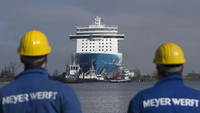  Meyer
Werft shipyard’s works council in Papenburg (Germany)
presented a
list of demands to management on 18 June 2014 under the title "Our
position on European Strategy". It lists ten conditions which
should be met before the takeover of the Finnish STX shipyard in Turku.
In addition to a guarantee for safeguarding German sites, employee
participation rights for the Finnish shipyard have also been demanded.
A working group made up of works council members from both countries is
to be established, since there is currently no European works council.
In September 2013, an exemplary company agreement was concluded in the
Meyer shipyard for Eastern European subcontractors (see report in
EWC News 3/2013). Meyer
Werft shipyard’s works council in Papenburg (Germany)
presented a
list of demands to management on 18 June 2014 under the title "Our
position on European Strategy". It lists ten conditions which
should be met before the takeover of the Finnish STX shipyard in Turku.
In addition to a guarantee for safeguarding German sites, employee
participation rights for the Finnish shipyard have also been demanded.
A working group made up of works council members from both countries is
to be established, since there is currently no European works council.
In September 2013, an exemplary company agreement was concluded in the
Meyer shipyard for Eastern European subcontractors (see report in
EWC News 3/2013).
|
|
9. The view
beyond Europe
|
| Demands for new IBM global
strategy
Exemplary framework agreement in the textile industry
The report contains case studies from several countries and was prepared in cooperation with the Global union federation IndustriALL. The framework agreement includes the entire production chain and covers approximately one million employees, including suppliers.
Global Occupational Health and safety
|
|
10.
Interesting Websites
|
|
Siemens' European works council
Works
council in the USA?
 The Volkswagen employees in Chattanooga, Tennessee, may have rejected the establishment of a works council by a small majority in February 2014, after political lobby groups had intervened massively to prevent a precedent in the anti-union southern states (see report in EWC News 1/2014). However, this situation should not last a long time, since it is the only Volkswagen plant without representation in the whole world. On the United Auto Workers' (UAW) website, the works council model is clearly explained.
Worldwide data on trade unions
available
Multilingual Platform for workers from other countries
We have gathered together many other interesting websites into a collection of links.
|
|
11.
New Publications
|
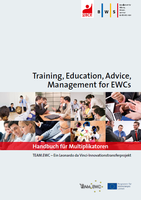  Advanced training
manual for European works councils Advanced training
manual for European works councils
This handbook for training multipliers was developed by the IG BCE trade union in Germany together with partners in an EU-sponsored project and released in October 2013. It focusses on improving intercultural skills, team building in the EWC, evaluating the day-to-day work in the EWC, the development of an action plan, as well as on the decision-making processes and conflicts within a EWC. Numerous ideas for seminars and sample agendas are shown in detail. It is also worthwhile reading for EWC members who do not deliver training. One chapter for example is devoted to the legal and organizational framework of EWC work. The 80 page manual is available in English, German and French.
  European comparison of
occupational health and safety reps European comparison of
occupational health and safety repsIn January 2014, the European Trade Union Confederation (ETUC) released this brochure on occupational health and safety, as a result of an EU-sponsored project. It includes a presentation of the different models of health and safety representative bodies in the individual EU countries. About half of the 68 page booklet, published in five languages, consists of training documents and bulletins for health and safety representatives. The aim of the project is to promote cross-border strategies for the prevention of health risks.
This report to the European Trade Union Confederation (ETUC) was published in March 2014. It examines the framework for the judicial safeguarding of transnational company agreements which was demanded by a large majority in the European Parliament in September 2013 (see report in EWC News 3/2013). There is strong opposition from employers against any legal regulations, although the number of such agreements is steadily growing. Whereas at the beginning there were still only "soft" issues such as gender equality, further education, occupational health and safety, now "hard" restructuring matters are increasingly the subject of such agreements. But so far there has been no certainty about their legal enforceability.
The Friedrich Ebert Foundation released this publication on the German Trade Union Confederation (DGB) in April 2014. It analyses developments in membership, the scope of collective bargaining agreements (bargaining coverage) and the dissemination of works councils in a variety of industries. A separate chapter examines German trade union policies since the outbreak of the financial markets crisis, in particular the campaigns to curb sub-contracting and for the introduction of a statutory minimum wage. The 33-page study is available in six languages. A new study on trade unions in Europe was also released in April 2014.
We have gathered a collection of further literature into a compilation.
|
|
12. The EWC Academy:
Examples of our work
|
|
German Tourism group on the way to new EWC Standards   On
15 and 16 May 2014, the select committee of the TUI European Forum met
together with central management at the company headquarters in Hanover
(photo). With the support of the EWC Academy, they held discussions on
the implementation of the standards from the new EU Directive. In
addition to updating the EWC agreement a clear and structured process
flow is to be developed for the consultation procedure, as is currently
being developed or is already implemented in other companies
(see report
in EWC News 4/2013). On
15 and 16 May 2014, the select committee of the TUI European Forum met
together with central management at the company headquarters in Hanover
(photo). With the support of the EWC Academy, they held discussions on
the implementation of the standards from the new EU Directive. In
addition to updating the EWC agreement a clear and structured process
flow is to be developed for the consultation procedure, as is currently
being developed or is already implemented in other companies
(see report
in EWC News 4/2013).The tourism group, which is the largest in Europe, had already established its European Forum in September 1996 on the basis of a "voluntary" article-13-agreement which was last updated in 2008. In addition, there was an agreement in 2002 to establish a dedicated airline committee for the group's airlines, which meets twice a year. Consumer Goods Manufacturer: benchmarking on consultation 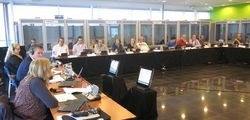  A
plenary session of the Unilever European works council was held from 26
to 28 May 2014 in Rotterdam (photo). The council includes 35
representatives from 18 countries. The Anglo-Dutch company is one of
the world’s largest manufacturers of food, cosmetics and
household products. The EWC Academy was commissioned to make a
comparison of the work of the Unilever EWC with other companies and to
give suggestions for future improvements. A
plenary session of the Unilever European works council was held from 26
to 28 May 2014 in Rotterdam (photo). The council includes 35
representatives from 18 countries. The Anglo-Dutch company is one of
the world’s largest manufacturers of food, cosmetics and
household products. The EWC Academy was commissioned to make a
comparison of the work of the Unilever EWC with other companies and to
give suggestions for future improvements.The EWC was established in September 1996 under Dutch jurisdiction and last updated its "voluntary" article-13-Agreement in 2010. Already in 2008, it had developed earlier than other bodies, a protocol with central management to define more precisely a well-structured consultation process divided into several stages. The EWC’s coordination committee is composed of up to eight members and meets once a month. This puts Unilever in a leading position, which can only be surpassed in French companies, such as for example, in the Axa insurance group (see report in EWC News 2/2009). The EWC developed its own "Barcelona Agenda", an alternative model to the short-term profit strategies of central management and was distinguished with the German Works Council Award in 2013.
Communication skills in packaging company   The
annual training week for the DS Smith EWC members was held from 2 to 6
June 2014 at the University of Warwick in the Midlands. The goal of
this training, which was carried out without interpreters, was to
improve language skills, and to strengthen the EWC profile from a
content viewpoint. The EWC Academy provided suggestions on the role of
individual representatives and on the use of new EU standards for
information and consultation. Following the acquisition of the Swedish
SCA group’s packaging division, the British recycling company
signed a EWC agreement in March 2013, which is among the best in
England (see report
in EWC News 1/2013). The
annual training week for the DS Smith EWC members was held from 2 to 6
June 2014 at the University of Warwick in the Midlands. The goal of
this training, which was carried out without interpreters, was to
improve language skills, and to strengthen the EWC profile from a
content viewpoint. The EWC Academy provided suggestions on the role of
individual representatives and on the use of new EU standards for
information and consultation. Following the acquisition of the Swedish
SCA group’s packaging division, the British recycling company
signed a EWC agreement in March 2013, which is among the best in
England (see report
in EWC News 1/2013).Experience with US management culture   The
second meeting for works councils in US companies was held on 30 June
and 1 July 2014 in the America House Munich. Whereas the first US
meeting in 2013 was limited to a small circle of participants (see report in
EWC News 2/2013),
this time 31 participants from 15 companies (photo) took part. There
was a focus on reports on the situation at Volkswagen in Tennessee
(see report in
EWC News 1/2014) and on the dissolution of the
Hewlett-Packard European works council (see report in
EWC News 1/2014). The third US meeting is planned
for summer 2015. The
second meeting for works councils in US companies was held on 30 June
and 1 July 2014 in the America House Munich. Whereas the first US
meeting in 2013 was limited to a small circle of participants (see report in
EWC News 2/2013),
this time 31 participants from 15 companies (photo) took part. There
was a focus on reports on the situation at Volkswagen in Tennessee
(see report in
EWC News 1/2014) and on the dissolution of the
Hewlett-Packard European works council (see report in
EWC News 1/2014). The third US meeting is planned
for summer 2015. |
|
13.
Current Training Schedule
|
|
The
EWC Academy and its forerunner organization, have been organizing and
delivering conferences and seminars for the members of European works
councils, SE works councils and special negotiating bodies since
January 2009. So far, 567 employee representatives from 220 companies
have taken part, including many of them for several times. This
represents around 19% of all transnational works council bodies in
Europe - not yet including the numerous in-house events of the EWC
Academy.
  Seminar
on EU legislation in
Strasbourg Seminar
on EU legislation in
StrasbourgCurrent developments in EU-labour legislation and how they affect German labour law will be covered in a seminar to be held from 15 to 19 September 2014 in Strasbourg. Besides a planned visit to the European Parliament there will also be discussions with the German Member of Parliament, Jutta Steinruck from the Social Democrats. The seminar is available to all employee representatives and is not limited to European works council members.
"Song and dance act" or fully-fledged European works council?   A
seminar is being held in the castle hotel Bad Wilhelmshöhe in
Kassel (photo) from 29 September to 2 October 2014 which examines the
legal basis for information and consultation particularly in relation
to restructuring. How can the European works council concretely put
into practice the consultation procedure and prepare a legally
water-tight opinion? The seminar is also suitable for SE works council
members. A
seminar is being held in the castle hotel Bad Wilhelmshöhe in
Kassel (photo) from 29 September to 2 October 2014 which examines the
legal basis for information and consultation particularly in relation
to restructuring. How can the European works council concretely put
into practice the consultation procedure and prepare a legally
water-tight opinion? The seminar is also suitable for SE works council
members.EWC Initiation seminar An introductory seminar will again take place in parallel. It is directed to newly elected EWC members and to works council members seeking information on the first establishment of a EWC. It is also suitable for SE works council members.
International works council conference in London   For
the fourth time already a conference is being held on 23 and 24 October
2014 in London. The meeting will be simultaneously interpreted. It is
particularly aimed at all members of European works councils falling
under British jurisdiction, as well as at employee representatives
wishing to familiarize themselves with the British system. For
the fourth time already a conference is being held on 23 and 24 October
2014 in London. The meeting will be simultaneously interpreted. It is
particularly aimed at all members of European works councils falling
under British jurisdiction, as well as at employee representatives
wishing to familiarize themselves with the British system.Language courses: Business English for German-spoken works council members The following dates are planned for 2014; from 6 to 12 July 2014 a language course in the English seaside resort, Eastbourne and from 12 to 18 October 2014 a language course near Dublin. Further seminar (in German, English interpretation on request) Further seminars with German - English interpretation
In-house events Please find a summary of possible topics for in-house events here: |
|
14. Imprint
|
|
EWC News is published by:
EWC Academy GmbH Rödingsmarkt
52, D-20459 Hamburg
Authors collaborating on this issue: Werner Altmeyer, Rita da Luz, Tea Omeragić Distributor of the German version: 20,246 readers Distributor of the English version: 3,284 readers Distributor of the French version: 3,134 readers
Newsletter archive: www.ewc-news.com
We are always pleased to receive comments and suggestions in relation to this newsletter as well as reports on your EWC activities. Please write us at: info@ewc-academy.eu
|



 A EWC seminar is being held in
Kassel from 29 September to 2 October 2014 which examines information
and consultation particularly under the aspect of restructuring. The
seminar is also addressed to SE-works councils.
A EWC seminar is being held in
Kassel from 29 September to 2 October 2014 which examines information
and consultation particularly under the aspect of restructuring. The
seminar is also addressed to SE-works councils.
